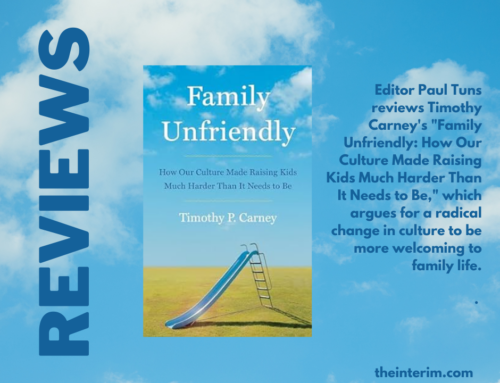 How to cover the passing of Canada’s most prominent abortionist was subject of much discussion in our offices, and during our editorial advisory board meeting. This is a major story and we had to give it prominent coverage. Henry Morgentaler is this country’s most famous abortionist, who testified before the House justice committee in 1967 calling for liberalization of Canada’s abortion law, the man responsible for killing tens if not hundreds of thousands of babies in the womb, and who successfully challenged the 1969 abortion law’s minimal restrictions so that today Canada operates without an abortion law. It would be difficult if not impossible to imagine the abortion debate today without Morgentaler’s influence.
How to cover the passing of Canada’s most prominent abortionist was subject of much discussion in our offices, and during our editorial advisory board meeting. This is a major story and we had to give it prominent coverage. Henry Morgentaler is this country’s most famous abortionist, who testified before the House justice committee in 1967 calling for liberalization of Canada’s abortion law, the man responsible for killing tens if not hundreds of thousands of babies in the womb, and who successfully challenged the 1969 abortion law’s minimal restrictions so that today Canada operates without an abortion law. It would be difficult if not impossible to imagine the abortion debate today without Morgentaler’s influence.
Our cover and article had to be somber, focusing not on the man but his legacy: the terrible toll of the abortion license. I hope we capture that. In most of the details of how to cover this man’s influence on the country, the various participants in our discussion were in agreement, except on one highly contentious matter: the story of Morgentaler, born in Poland in 1923, as a survivor of the Holocaust. Many in the media focus on a Morgentaler narrative that has him overcoming personal tragedy, including the death of his mother and sister, to become a fighter for women’s rights in Canada. The problem is that details of his time in Auschwitz and then Dachau are often murky – as they can be at a time of tumult (World War II, forced migration, and labour and murder camps).
Over the years many of us in the pro-life movement have been approached by those with scattered pieces of evidence, old stories, and various theories that the biographical details of Morgentaler’s Holocaust survival don’t quite add up. There might be good reason to doubt Morgentaler’s tale, but the problem with publishing those stories is that there is no smoking gun evidence to prove the abortionist lied about his time in Nazi concentration camps. Another problem is that many of the pieces of evidence and various ideas of Morgentaler’s fraud contradict each other. For example, we have heard a story that Morgentaler lacks the identifying tattoo Jews were branded with in camps, but we have also heard that his tattoo didn’t match the format and numbers used at the camps he claimed to be in, and is perhaps a fake. Both cast doubt on Morgentaler’s biography, but they contradict each other. There are more damning stories, but it would not be right to publish them without better evidence.
If Morgentaler was lying about being a Holocaust survivor, does that excuse the holocaust he was the primary cheerleader and executioner for in Canada? Not at all. Does it matter in the grand scheme of things? Perhaps the media coverage would have been different, perhaps the debate would have gone in a different direction, but morally it does not matter much. During our editorial board meeting, one participant said if Morgentaler lied about his time in the camps, he would be exposed as a fraud. One board member piped up: “Worse than a fraud, he was a murderer.” Indeed.
Our editorial assumes the commonly accepted narrative about Morgentaler: that he spent some time in the camps and that this somehow influenced what he came to be. But we think this is worse: that having witnessed the degradation of human beings by the Nazi murderers, he should have revolted against dehumanizing ideologies rather than embrace them; having seen the grisly toll of a genocide, he should not have resorted to carrying out one of his own. Our editorial says that rather than explaining or excusing Morgentaler’s actions, the Holocaust makes the rest of his life all that more perplexing, and tragic.
We would condemn Morgentaler also as a fraud if it were proven, and would publish such information if we were fairly certain to be true. We have neither the resources to go on a fishing expedition in German archives, nor the inclination to confirm or contradict that story. To repeat, worse than being a fraud, Morgentaler was a murderer. But those who make the abortionist a hero as a man who overcame the evils of the Holocaust, especially those in the media, should have vetted their man better. The female columnists who lionized him (Heather Mallick at the Globe and Mail and then the Toronto Star), Sandra Martin (the Globe), and Elizabeth Renzetti (Globe) could have looked closer at Morgentaler’s background. So should have his two fawning biographers, Catherine Dunphy (Morgentaler: A Difficult Hero) and Eleanor Wright Pelrine (Morgentaler: The Doctor Who Couldn’t Turn Away).
Journalists are forever congratulating themselves for their skepticism, which, they tell us, leads them to courageously seek the truth. Considering the murkiness of the Morgentaler story, you’d think that skepticism would kick in. But then again, why would it – his biography made for great copy. In 2003, he told Mallick, then of the Globe: “I knew I could not save my mother (in Auschwitz in 1944). But I could save other mothers … it became almost like a command. If I help women to have babies at a time when they can give love and affection, they will not grow up to be rapists or murderers. They will not build concentration camps.”
The stories of doubt would no doubt make for great copy in The Interim, but until we have more evidence, we must be skeptical of stories that would feel so good to publish, but which would be irresponsible to print. And it is all a distraction; the issue is not the man but his legacy. About that there is much disagreement among Canadians, and we must make our case that it is unabated evil.
-Paul Tuns




